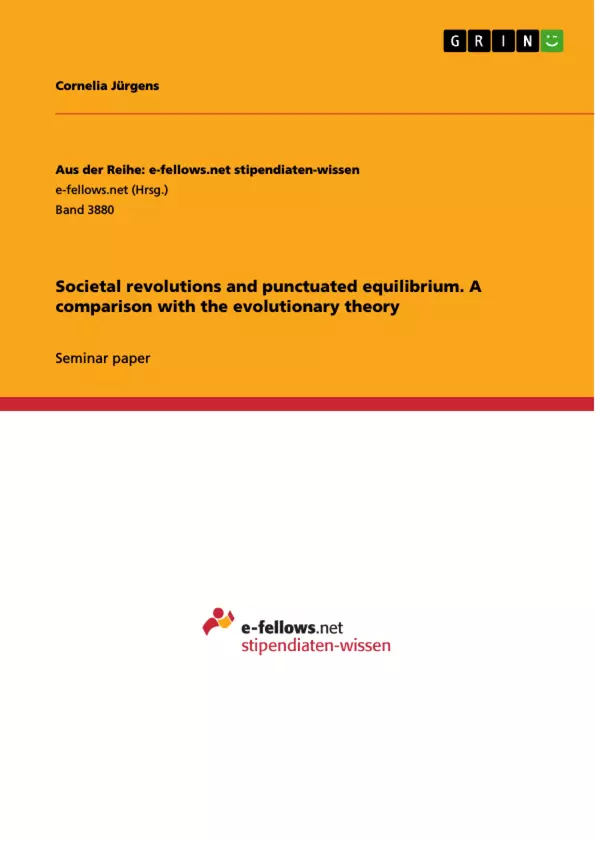Since revolutions usually describe big changes in a society that happen within a relatively short amount of time, it is most interesting to look into the connections between societal revolutions and the evolutional theory of punctuated equilibrium. A look from "above" could lead to a new understanding of both concepts or new ways to handle them. The focus of this text will be the concept of revolutions and how to deal with them, with punctuated equilibrium being the point of comparison.
Revolutions are a societal phenomenon that has been an important factor to societal change for centuries. Few would deny the connection between the French revolution and the spread of democracy in Europe, for example. Today, there are several places and situations in the world that might break out into revolution soon, for example the Hong Kong protests, the recurring strikes in France or simply the fact that many people are unsatisfied with their leaders and their previous actions all across the world, which clearly shows the relevance of revolutions even today.
Inhaltsverzeichnis (Table of Contents)
- Introduction
- Punctuated equilibrium - a short summary
- Comparison between punctuated equilibrium and revolutions
- Human history is mostly static.
- The influence of climate change.
- The necessity of adapting or revolting........
- Conclusion
Zielsetzung und Themenschwerpunkte (Objectives and Key Themes)
This text explores the connection between societal revolutions and the evolutionary theory of punctuated equilibrium. It aims to provide a new understanding of both concepts by comparing their similarities and differences. The text focuses on how societal revolutions, characterized by rapid changes in a short time frame, mirror the bursts of rapid speciation described in punctuated equilibrium.
- Comparison of societal revolutions and punctuated equilibrium
- The role of rapid change in both biological and societal evolution
- The concept of stasis in both evolutionary and historical contexts
- The influence of external factors, like climate change, on both evolutionary processes and societal revolutions
- The potential implications of punctuated equilibrium for understanding societal change
Zusammenfassung der Kapitel (Chapter Summaries)
- Introduction: This chapter introduces the topic of societal revolutions and their relevance in a contemporary context. It establishes the connection between revolutions and the concept of punctuated equilibrium and outlines the structure of the text.
- Punctuated equilibrium - a short summary: This chapter provides a brief overview of the theory of punctuated equilibrium, explaining its key concepts and contrasting it with the theory of phyletic gradualism. It discusses the role of allopatric speciation and the explanation for gaps in the fossil record.
- Comparison between punctuated equilibrium and revolutions: This chapter delves into the comparison between punctuated equilibrium and societal revolutions. It argues that human history is characterized by periods of rapid change (revolutions) interspersed with periods of relative stasis, mirroring the pattern of rapid speciation followed by long periods of stability in punctuated equilibrium. It highlights how both phenomena are driven by the need for adaptation and occur in relatively short bursts of change compared to the longer periods of stability.
Schlüsselwörter (Keywords)
The key concepts explored in this text include societal revolutions, punctuated equilibrium, phyletic gradualism, allopatric speciation, stasis, rapid change, adaptation, and the influence of external factors on both biological and societal evolution. The text also touches upon historical events such as the French revolution, the scientific revolution, and the Neolithic revolution, using them as examples to illustrate the concept of punctuated change in human history.
Frequently Asked Questions
What is the theory of punctuated equilibrium?
Punctuated equilibrium is an evolutionary theory suggesting that species experience long periods of stability (stasis) interrupted by brief, rapid bursts of significant change and speciation.
How do societal revolutions compare to biological evolution?
Just like biological bursts in punctuated equilibrium, societal revolutions describe massive changes that occur within a relatively short timeframe after long periods of social stability.
What role does "stasis" play in human history?
The text argues that human history is mostly static, with established systems remaining unchanged for long periods until a "punctuation" or revolution forces a rapid adaptation.
Can climate change trigger revolutions?
Yes, external factors like climate change can create pressure on biological and social systems, necessitating rapid adaptation or leading to revolutionary shifts in society.
Which historical events illustrate this theory?
The text references the French Revolution, the Scientific Revolution, and the Neolithic Revolution as examples of rapid societal "punctuations."
- Citation du texte
- Cornelia Jürgens (Auteur), 2020, Societal revolutions and punctuated equilibrium. A comparison with the evolutionary theory, Munich, GRIN Verlag, https://www.grin.com/document/1119515



